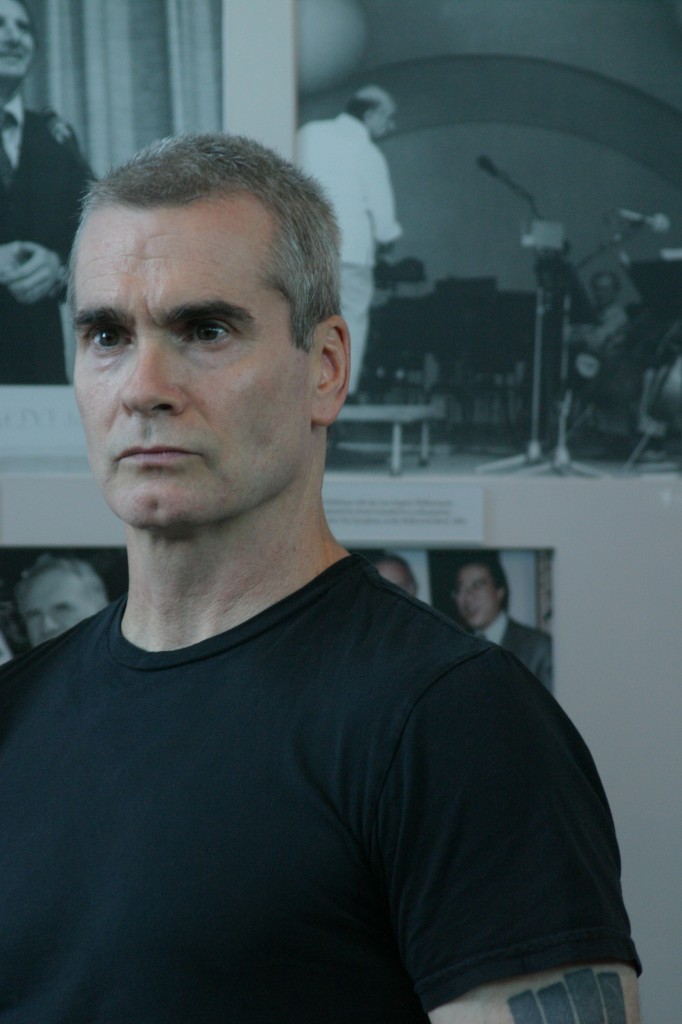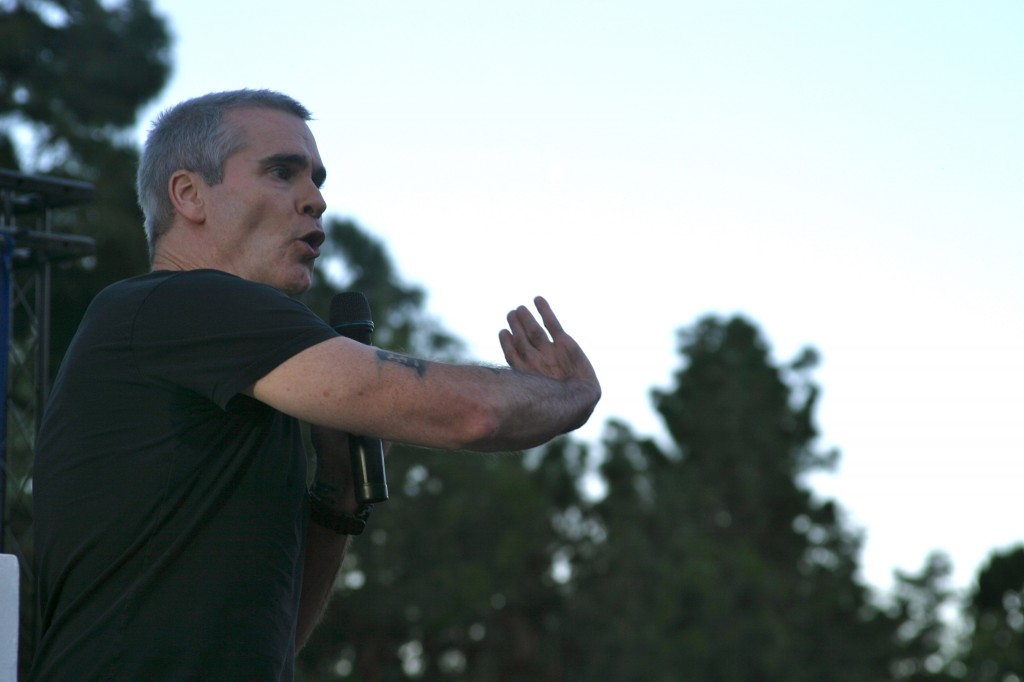Henry Rollins Speaks About Miles Davis, Kurt Cobain and Hip Hop
The more I familiarize myself with Henry Rollins, the more I appreciate him. As a musician, he is punk-rock and bad ass. As a humanitarian, he is outspoken and sticks to his convictions. He tours US bases in other countries to perform for the troops while being against the war. Rollins has a reputation for being loud and angry but when speaking one-on-one to people, he is nothing but polite, humble and accommodating.
Henry Rollins is knowledgeable, passionate and most of all, the dude is a G.
I approached him recently at the unveiling ceremony of the Miles Davis Forever stamp in Hollywood, where he gave a speech honoring Davis. I stalked him for a good two hours before I finally walked up and asked him, among the noisy crowd, if he would answer some questions.
Without losing a beat, Rollins looked at me and said, “Sure, whatever you want.” And this is the result of that interview:
Fusic: In the speech you just gave about Miles Davis, you spoke about him breaking lots of racial barriers during his time. Can you tell me more about that?
Rollins: There’s a lot to be read in the biography of Duke Ellington called “Beyond Category” where he talks about what it was like to be an African-American musician in America. Where you sell out a ballroom in Chicago but there’s no hotels for black people in Chicago so you have to drive out to a distant suburb or as Duke Ellington did, he rented trains. And so this is what African-American artists are being treated like [at that time.] Meanwhile, they’re giving the world this incredible music, and they’re being treated like second, third class citizens, as if anyone needs to get treated like that at all.
And Miles Davis turned it on its head. He’d turn his back on the audience. He learned from Dexter Gordon to dress really well. Sunglasses on in a dark club. Playing this amazing music. Showing you, “here’s my genius.” You know what I mean? And that gives you such a sense of confidence when you hear that, ’cause you realize, “That’s what I wanna do with music, that’s what I wanna do with any art I do is be defiant.” Like a swan: graceful, and ready to fight. And that’s Miles Davis. No musician I know embodies that more than him.
And as an American musician, he’s completely unique. In that there’s nothing like him, as far as recording ethic, his bravery, he’s really broken the mold.
Fusic: Also, he wasn’t necessarily anti-American, but his ideals went against the specific structured system, so for him to be on a stamp says a lot.
Rollins: But that’s also the freedoms that we enjoy in the first Amendment of the Constitution. That you could go against the grain and still get a postage stamp, hopefully. And that’s what hopefully, the greater aspects of being an American are about. You can go, “This all sucks” and they’re like, “Hurrah, hurrah” (Claps his hands in a dignified manner.) Even if they all disagree, they go “Well, he’s got an opinion.”
Fusic: They can’t deny it.
Rollins: Yeah. Democracy’s a rough room. It’s tough. ‘Cause you gotta hang out with people you don’t like and go “Ah, I’ll give him half my sandwich, he’s a fellow American. Bastard.” So Democracy’s not for the weak, ’cause you got equality. It’s tough. A lot of elbows in there.
And so Miles Davis…we were talking about his courageousness, I don’t think he necessarily thought of himself as courageous as like, ‘I’m Miles Davis, therefore this is what I do.’ A leopard doesn’t know that he has spots, Miles Davis could do nothing else but do that music that you heard him do.
When you see Miles as an icon, it’s hard to believe he ever got a bad review. And he got a ton of them. I mean, there’s a very famous album called On The Corner and the critics went out of their way just to go, ‘He’s lost his touch, he’s out of his mind.’ When the re-release of the album came out years ago, a lot of those critics came out and said ‘OK, he was right, we were wrong, we’re sorry, he was right.’ It’s one of those records that taught me…it’s like punk rock to me.
Fusic: Kurt Cobain has you listed as one of his biggest influences. Did you guys ever converse about that?
Rollins: Here’s all my moments with Kurt Cobain: Whenever I was in the same room with Kurt, he would always freak out, get really nervous and just get fidgety. One time, I looked at him, and just looking at him was like I hit him, I looked at him and he goes (makes a nervous expression) I said, “Hey Courtney, what’s up with your boyfriend?” She said, “He’s afraid of you ’cause he doesn’t wanna be weird in front of you and he’s kind of a fan and he’s just nervous, so…when Kurt gets nervous, he just bails.”
And the last time I ever saw him was at one of my shows, and it was a venue where there was a store-front window behind the stage, so people could just look in, and you could look back out. And I was talking to people after the show, and he was outside looking in at me from the sidewalk, just like this (he stands frozen.) And I think that’s a distance he felt safe. But I know people who he would speak to, where he’d be, “You know Henry, what’s he like?” So I never had the chance to meet him. You know, I’m quite a fan, I mean, he seemed like the real thing and made good music but uh, was in the same room as him, and never had the honor to shake the hand.
Fusic: He probably felt the same way about you.
Rollins: I mean, he was great. And sadly missed, but umm, I guess he had a thing with me. He didn’t wanna hang out or something.
Fusic: Cobain said that Hip Hop was the last original form of music left in America. What do you think about that statement and what do you think of Hip Hop?
Rollins: I think Hip Hop is in our lifetime, the most transformative music of our time. In that, as far as bringing white American youth into the black American experience. As far as, “Now I have a better understanding of a neighborhood that I’m probably never gonna go in” and understanding police brutality, inequality, how much anger can be engendered in that.
Hip Hop is real cross-over music, and in a way that’s the job of music, to break down barriers. And music’s like smoke, it gets everywhere, there’s no culture without it. Even in Renault, Saudi Arabia, where it’s kind of banned, I’ve bought bootleg records in Renault. It’s low-key, but it’s around. In fact, I’m playing a song I got in Renault this Saturday on my radio show. And so it’s Hip Hop.
I’ve had this conversation with Russell Simmons, and I said, “It is the most transformative music of our time” As far as uniting young people all over the world. It’s like, “We are young, we’re looked down upon sometimes.” Hip Hop addresses that like rock ‘n roll never could, like jazz could but it only went so far with the demographic, where Miles Davis was very successful sales-wise.
Like John Coltrane, some of the worst shit you see on tv, those records outsell A Love Supreme. So it’s Hip Hop that really got across. To this day. And watch, 100 years from now, that will still be street music; in prison cells, in cars, it is with us forever. So you can like it or not like it, but you’re never getting rid of it.
Later on that night, I was reading people’s tweets about meeting Rollins at the event, and they were just excited, being fans. Afterwards I checked Rollins’ twitter, and he had tweeted, “Got to be in a photo with Herbie Hancock tonight. Legend!!!!!”
And that is what is so awesome about Henry Rollins. He is applauded and loved the world over yet still, in a most humble way, appreciates passionately other great artists the way his fans appreciate him.
WORDS/PHOTOS: Ani Yapundzhyan @aninomous


